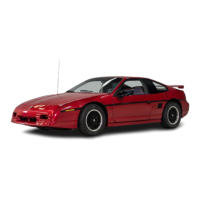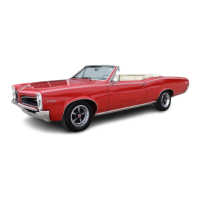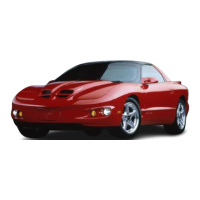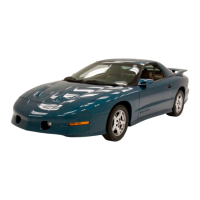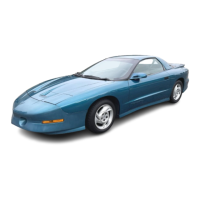Do you have a question about the Pontiac 1955 and is the answer not in the manual?
Warranty details for tires against defects in material and workmanship.
Warranty coverage for the Pontiac Delco battery for 90 days or 18,000 miles.
Guidelines for breaking in a new car's engine, transmission, and rear axle.
Location of engine and car serial numbers for identification and service.
Identifies where style, paint, and trim numbers are stamped on the vehicle.
Explains the types of keys and their corresponding numbers for the vehicle.
Instructions for starting the engine of Hydra-Matic and Synchro-Mesh equipped cars.
Provides overall length, wheelbase, and gas tank capacity for different models.
Lists engine bore, stroke, displacement, electrical system, and cooling system capacities.
Details compression ratios and fuel requirements for different transmissions.
Lists bulb numbers and candle power for various lamps and indicators.
Explains the function and features of the car's speedometer.
Describes the battery indicator and what it shows about electrical current flow.
Explains how to read the water temperature indicator and what to do if it reads hot.
Details how to read the fuel gauge and the meaning of its markings.
Explains how to read the oil pressure gauge and its indications.
Describes the combined switch for headlamps and instrument panel lights.
Explains how to adjust the brightness of the instrument panel lights.
Details the operation of the windshield wiper control knob.
Describes the illuminated ignition and starter switch for convenience.
Explains the operation of the hand brake lever, also known as the "Cane Handle".
Describes the two sets of keys and how to secure key numbers.
Instructions for locking the car doors from the inside and outside.
Instructions on how to remove and replace the ash tray.
Explains the use of two control knobs for outside air circulation.
Details how to adjust the driver's seat for comfort and visibility.
Describes the function and adjustability of the car's sun visors.
Explains how to use tool storage to prevent rattles in the trunk.
Describes the operation of the hood latch and safety hook for opening the hood.
Explains the fuse protection system, circuit breakers, and fuse block locations.
Guide to selecting speed ranges for normal driving, acceleration, and controlled power.
Step-by-step instructions for starting the engine with the Hydra-Matic transmission.
Explains the two positions within the DR range for different driving conditions.
Describes how accelerator pedal input affects gear shifts in DR range.
How to stop the car using the selected driving position and brakes.
Instructions for using the LO range for specific conditions like snow or steep grades.
How to engage reverse and rock the car if needed.
Safety precautions for parking the car, especially on inclines.
Procedure for starting the engine by pushing the car due to a low battery.
Instructions for safely towing the car to prevent transmission damage.
Reference to page 30 for information on fluid recommendations and checking.
Detailed steps for starting the engine on Synchro-Mesh equipped cars.
Information on clutch operation and maintenance.
Tips to extend the life of the clutch by avoiding improper usage.
How to adjust the clutch pedal for proper free travel and engagement.
Overview of the ventilation system including panes, ducts, and heater.
Description of the thermostatic temperature control for the heater.
How the "AIR" control lever manages outside air entry for heating and defrosting.
Using the "AIR" control to force heated air for windshield de-icing.
Explains when and how to use the "BLOWER" switch for air circulation.
Examples of settings for normal driving, maximum heat, and rain.
Settings for the ventilation system to prevent outside odors.
Important safety warning about the dangers of carbon monoxide exhaust.
Recommendation for periodic safety checks by a Pontiac dealer.
Information on tire types, inflation, and proper maintenance for maximum service.
Tips on keeping tires properly inflated for safety and longevity.
Step-by-step guide on how to change a flat tire.
Explains tire balancing and its importance for smooth driving.
Recommendations for switching tires to equalize wear and prolong life.
Tips on driving habits and service to maximize tire life.
Lists coolant capacities for different models with or without heaters/AC.
Explanation of thermostat function and radiator cap pressure.
Safety warning about removing a hot radiator cap due to pressure.
How to use rust preventive chemicals in the cooling system.
Procedures for draining the cooling system when storing the car.
Advice on pouring anti-freeze and recommended types.
Criteria for knowing when brake adjustments are needed based on pedal travel.
Signs that indicate when brake linings need replacement.
Advice on common brake issues like squeaks or pulling to one side.
Suggestions to extend brake life and reduce expenses.
Tips for anticipating stops, checking master cylinder, using correct fluid, and maintaining cleanliness.
How to tell when the steering gear needs adjustment due to play or looseness.
Explanation of front suspension and steering for ride quality.
Recommended lubrication intervals based on driving conditions.
Lubrication and checking of steering gear units.
Correcting leaks and maintaining fluid level in the power steering system.
Lubrication checks for the Synchro-Mesh transmission.
Lubrication checks for the rear axle.
Procedure for checking the Hydra-Matic fluid level.
Important lubrication points during spring/fall tune-ups or every 10,000 miles.
Lubrication points inside the distributor for spring/fall or 10,000 miles.
Cleaning procedures for air cleaner and crankcase ventilators.
Lubrication of body components like locks and strikers.
Overview of services: adjustments, lubrication, and system testing.
Adjustments for ignition, carburetor, timing, and idle speed.
Checking and testing ignition, compression, and carburetion systems.
Description of the adjustable front seat for driver comfort and vision.
Improvements in power brakes for safety and comfort.
Setup and tuning instructions for the radio and speaker.
Description of the optional safety cushion for the instrument panel.
Methods for preserving the car's finish and value through cleaning.
Removing dust and dirt from upholstery.
General guidance on cleaning interior fabrics.
How to clean and care for the plastic back window.
Methods for cleaning carpet floor coverings.
Schematic diagram for the direction signal electrical system.
Overall electrical system wiring diagram for 1955 models.
How driving habits affect car maintenance needs.
How driving speeds influence service requirements.
Impact of using low gears on fuel and service expenses.
How careful handling reduces service needs.
Importance of warming up the engine to reduce wear.
How road type, climate, and terrain affect car service needs.
Recommended service intervals based on mileage.
Recommended services for spring and fall tune-ups.
Other maintenance items like brake adjustments and alignment.
| Brand | Pontiac |
|---|---|
| Model | 1955 |
| Category | Automobile |
| Language | English |



